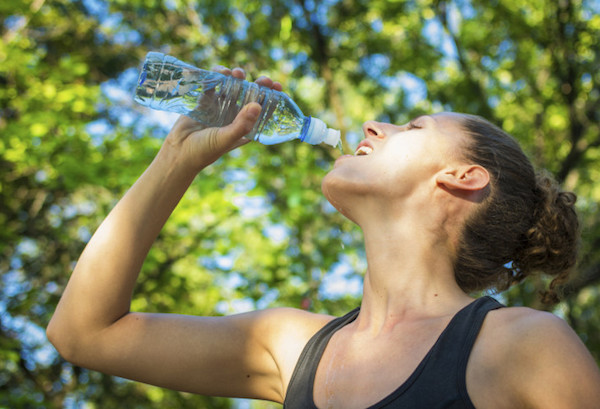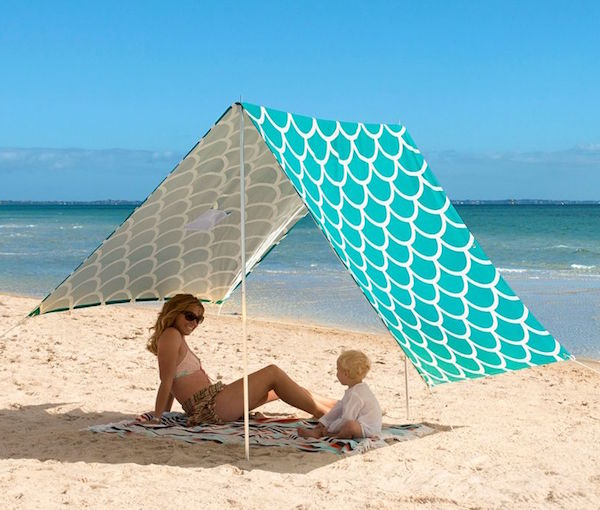You’ll know the feeling. You’ve been at the beach all day and had a great day in the sun, and when you get home, you feel worn out and need to sleep.
This isn’t a coincidence, and there are several reasons why this happens, and we’ll reveal how you can avoid this feeling.
So What Makes You Tired In The First Place?
Dehydration
When you’re out in the sun, your body gets warm, so your body sweats. When your body sweats you lose fluid which also contains essential electrolytes including salt.
These electrolytes help to perform routine functions, so your body runs efficiently. A fall in electrolytes caused by even mild dehydration will make you feel tired and sluggish.

Due to less fluid being present in your body this results in a lower blood volume, which means your blood is thicker. Therefore, your body has to work harder to pump blood, oxygen and other essential nutrients around the body. The extra energy it takes to do this can make you feel tired.
So as you can see the reason we get dehydrated is due to two reasons; our body working harder to pump nutrients and the fact that we may be losing fluids to due to increased sweating.
To prevent dehydration, you need to ensure that you consume more water throughout the day. This allows you to maintain hydration and also replace lost fluids.
Lower Blood Pressure
If your body overheats, this can cause blood pressure to fall however due to your body self-regulating most people won’t be able to feel any physical difference. Dizziness and headaches are a prominent symptom which is caused because less oxygen and nutrients are being supplied to the brain.
This drop in oxygen supply will lead to your body working harder which can contribute to you feeling tired. To combat low blood pressure its recommended to stay hydrated.
Body Temperature Balance
Your body has an optimal temperature that it needs to be at to function efficiently, and although you may not realise, it's working hard 24 hours a day to maintain this balanced temperature. It reacts to both internal and external changes such as temperature and heart rate.
So when you’re in a hot environment which causes your body temperature to rise, your body then works to cool you down. This is usually in the form of increasing the amount that you sweat, and the hotter you get, the harder it works.
This extra work uses more energy which then makes you feel more tired especially if your body isn’t used to a particular level of heat such as if you go on holiday to a hot destination, but you live in a colder environment.
The effects can be even more drastic if you're overweight or generally have a bigger body as your body has to work harder to cover a larger area.
Comfort Association
Our bodies are incredibly complex and adapt to consistency and triggers. For instance, if you follow the same bedtime routine such as taking a bath, it adjusts to this and eventually will time Melatonin release closer to when you have a bath as it recognises that a bath means you’re getting ready for bed.
In this case, your body may associate being comfy and warm with going to bed at night so your body associates with this. This can mean that when you go out on a sunny day and your body temperature begins to rise, that your body gets sleepy as this is what it’s been trained to do overtime too.
Sudden Temperature Fall
Have you ever been out in the sun and not felt tired until you get home and step into an air-conditioned room or after a cold shower. This is because the sudden drop in body temperature triggers tiredness.
However, this is not because you’ve cooled down, but because the drop in temperature has been sudden. To avoid this happening, you need to slowly reduce your body temperature over time to prevent any fatigue.
You can cool down gradually by slowly dropping the temperature on your air conditioning or shower setting as your body adjusts to the new temperature.
Chemical Reactions
We know that the sun can make you tired, but it can also trigger chemical reactions within the body that affect the way that it functions.
Sunlight contains ultraviolet rays which can cause body changes such as sunburn and wrinkles. The body doesn’t just allow this to happen and reacts to repair any damage that occurs, but this extra work causes fatigue.
Sunburn is the most common reaction, and your body combats this by triggering fluid to flow towards the skin to cool down the burnt area. This means that there is less fluid for the rest of the body to sweat so you’ll get dehydrated at a quicker rate.
If this isn’t addressed, then this can escalate to more severe conditions such as heat stroke or heat exhaustion. There are clear symptoms for this including nausea, dizziness and heavy sweating.
Ways to Reduce Dehydration
Stay Hydrated
The best way to avoid dehydration is to regularly drink water to replace the fluid that’s lost through sweating. You need to bring a water bottle that can be refilled throughout the day, and you can also eat fruit and vegetables that have high water content.
It’s important to avoid certain types of liquids such as alcohol or caffeinated drinks as these can work like diuretics and reduce the water volume in your body and make you more dehydrated.
Stay in the shade
One way to drastically reduce your rate of dehydration and fluid loss is to stay directly out of the sun. As well as limiting heat fatigue, it will also lower the chances of sunburn and skin damage while still being able to enjoy the outdoors and sunny weather.

Staying in the shade is especially important throughout the hottest parts of the day which are usually in the early afternoon.
You can create your shade or use already available solutions. For example, you can bring an umbrella with you or you can find a tree to sit under.
Wear Sunglasses
Wearing sunglasses can protect your eyes from dangerous UV rays which can lead to serious eye problems. Also, the area around your eyes is sensitive and needs to be protected by the sun.
All sunglasses have a rating and will indicate whether they are suitable for blocking block UVA or UVB rays or both. The more types of rays they prevent, the more protection that they offer.
Use Sunscreen
Sunscreen helps to reduce the dangerous effects of direct sunlight including sunburn. When you suffer from sunburn, this makes the body work harder to supply the affected area with fluid which can lead to fatigue.
A broad spectrum high SPF sunscreen should be applied directly onto your skin before exposing yourself to sunlight. This isn’t a one-off application and needs to be reapplied throughout the day at regular intervals.
